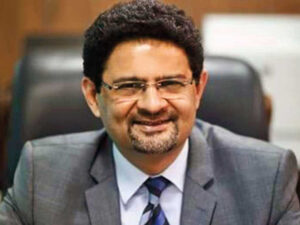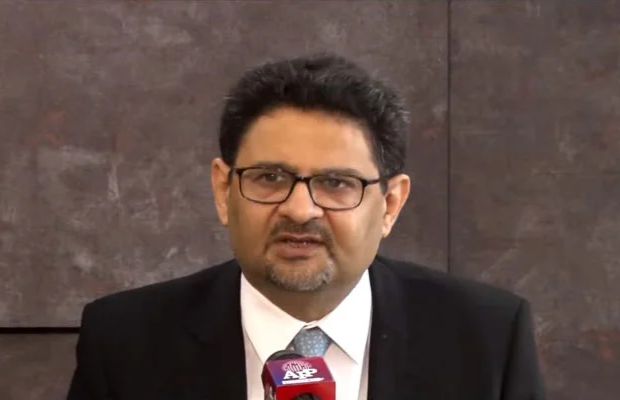Name: Miftah Ismail
Date of Birth: 23 July 1965 (Age 59)
Birth Place: Karachi, Sindh, Pakistan
Party: Pakistan Muslim League (N)
Spouse(s): Reema Miftah Ismail
Alma mater: Duquesne University (B.S), Wharton School of the University of Pennsylvania (Ph.D.)

Who is Miftah Ismail?
- Early Life and Education: Miftah Ismail, a Pakistani politician and political economist, was born on July 23, 1965, in Karachi, Pakistan. He pursued his education diligently, earning a B.S. degree in business studies from Duquesne University in 1985. Subsequently, he obtained a Ph.D. degree in public finance and political economy from the prestigious Wharton School, University of Pennsylvania, in 1990.
- Professional Career: Ismail began his professional journey with the International Monetary Fund (IMF) as an economist based in Washington, D.C., during the early 1990s. However, he later returned to Pakistan to join his family business, Ismail Industries Limited, in 1993. The company specializes in the manufacturing of confectionery, biscuits, potato chips, and plastics, boasting an impressive annual revenue of approximately $200 million.
- Political Engagement: Ismail’s entry into politics occurred in 2011 when he joined the Pakistan Muslim League (N) (PML-N). He held various positions within the party, including serving as the head and vice-chairman of the Punjab Board of Investment and Trade from 2012 to 2013. Additionally, he played a pivotal role in the party’s election strategy team and manifesto committee during the 2013 Pakistani general election.
- Government Appointments: Ismail’s expertise and experience led to several government appointments. In October 2013, he became a member of the Board of Directors of Pakistan International Airlines (PIA) and the Sui Southern Gas Company (SSGC). He later served as the head of the Federal Board of Investment and was appointed as a junior member of Prime Minister Nawaz Sharif’s cabinet on January 4, 2014.
- Academic Contributions: Alongside his political and business endeavors, Ismail contributed to academia as adjunct faculty at the Institute of Business Administration. Additionally, he served as the chairman of the board at Karachi American School, emphasizing his commitment to education and community development.
- Ministerial Role: Ismail’s significant contribution to economic affairs led to his appointment as the Federal Minister for Finance, Revenue, and Economic Affairs in Shahid Khaqan Abbasi’s cabinet on April 27, 2018. He served in this capacity until May 31, 2018, overseeing crucial aspects of Pakistan’s fiscal policy and economic management.
- Reappointment and Resignation: In a significant development, Ismail was reappointed to the position in 2022. However, his tenure was cut short once again when he resigned from his post in September of the same year. His resignation paved the way for the return of Ishaq Dar to the position of Federal Minister for Finance, Revenue, and Economic Affairs.
- Political Dynamics: Ismail’s resignation and the subsequent return of Ishaq Dar marked a shift in the political landscape, reflecting the intricacies and changes within the government. The decision to resign likely involved various factors and considerations, shaping the trajectory of economic policies and leadership within the government.
- Public Response: Ismail’s resignation and the return of Ishaq Dar garnered attention and sparked discussions among policymakers, analysts, and the public alike. The move prompted assessments of its potential impact on economic stability, policy continuity, and the overall governance framework of the country.
- Future Implications: Ismail’s resignation and the subsequent reinstatement of Ishaq Dar underscored the fluidity of political appointments and the dynamics within government institutions. The events may have implications for future policy directions, political alliances, and the overall governance landscape of Pakistan.
- Dismissal from Party Position: On June 19, 2023, Miftah Ismail faced dismissal from his role as the general secretary of PML(N). Reports suggest that his removal stemmed from purported disfavor by Maryam Nawaz, the Chief Organizer of PML(N) and daughter of the party’s leader, Nawaz Sharif. This alleged displeasure was attributed to Ismail’s critique of Ishaq Dar’s economic strategies and policies.
- Internal Party Dynamics: Ismail’s removal highlighted internal rifts within PML(N) and shed light on the complexities of party politics. The decision to dismiss him from his position underscored the influence of key figures like Maryam Nawaz and the dynamics shaping leadership roles within the party.
- Policy Critique: Ismail’s criticism of Dar’s economic policies evidently played a significant role in his ousting from the party leadership. This suggests differing perspectives within PML(N) regarding economic approaches and the implications of such dissent within the party’s hierarchy.
- Impact on Party Structure: The dismissal of Ismail as the general secretary may have broader implications for the party’s organizational structure and internal cohesion. It reflects the challenges of maintaining unity and consensus within political parties amidst divergent viewpoints and leadership dynamics.
- Future Directions: Ismail’s removal raises questions about the future trajectory of PML(N) and the implications for its leadership dynamics. The incident may shape the party’s stance on economic issues and influence its strategy in the broader political landscape of Pakistan.
On 24 June 2023, he resigned from all senior positions of the PML(N) and party committees, while also announcing that he wouldn’t be active in electoral politics anymore.
CandyLand History:
Since its launch of CandyLand in 1988, Ismail Industries has become the biggest confectionery maker and exporter in Pakistan. Along the way, they’ve grown by introducing brands like Bisconni for biscuits and cookies, and SnackCity for chips and peanuts. They’ve also expanded their reach through Astro Plastics, which produces packaging and plastic films.
( Last Updated: 11 March 2024)
